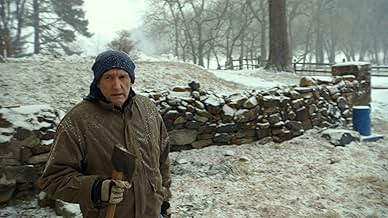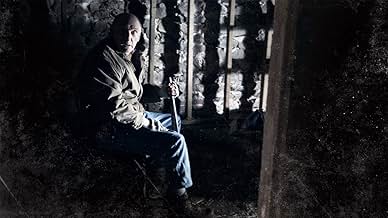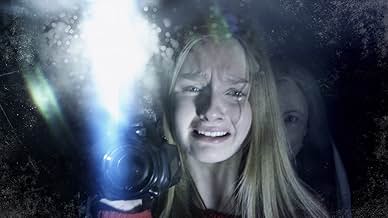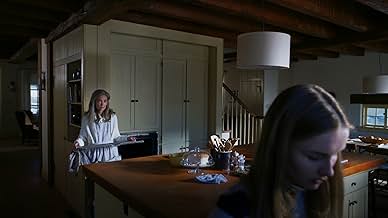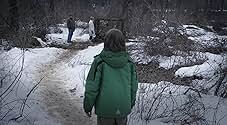Two siblings become increasingly frightened by their grandparents' disturbing behavior while visiting them on vacation.Two siblings become increasingly frightened by their grandparents' disturbing behavior while visiting them on vacation.Two siblings become increasingly frightened by their grandparents' disturbing behavior while visiting them on vacation.
- Awards
- 1 win & 14 nominations
Erica Lynne Arden
- Train Passenger
- (uncredited)
Kevin Austra
- Street Walker
- (uncredited)
Richard Barlow
- Police Officer
- (uncredited)
John Buscemi
- Police Officer
- (uncredited)
Evan Charles
- Surfer
- (uncredited)
- Director
- Writer
- All cast & crew
- Production, box office & more at IMDbPro
Blumhouse Horror Films, Ranked by IMDb Rating
Blumhouse Horror Films, Ranked by IMDb Rating
Blumhouse Productions has been a major force in the horror genre since 2007's Paranormal Activity became a worldwide sensation. See how IMDb users rank all of Blumhouse's horror movies since 2007.
Storyline
Did you know
- TriviaAccording to statements made on Twitter, director M. Night Shyamalan prepared three different cuts of the film: one that was "pure comedy," another that was "pure horror," and a final one that "fell somewhere in between."
- GoofsThe amount of snow covering the landscape varies dramatically from day to day and even between scenes taking place on the same day.
- Alternate versionsIn the FX broadcast, to keep the TV-14 rating, the defecation featured in the movie are censored. In addition, two scenes involving nudity is blurred out.
- SoundtracksPossession
Written by Harry Revel
Performed by Les Baxter and His Orchestra and Chorus
[Theremin - Dr. Samuel Hoffman]
Courtesy of RCA Records
By arrangement with Sony Music Licensing
Featured review
Ever since the mammoth success of The Sixth Sense (1999), there's been a push to promote every subsequent M. Night Shyamalan movie as a horror film. From Unbreakable (2000) to The Happening (2008) every new movie was sold as a dark and twisty shocker; whether it was in fact a poetic romance with pointed political commentary (The Village, 2004) or an eccentric bedtime story disguising a self- reflexive observation on the writing process (Lady in the Water, 2006) the marketing always made the film appear vaguely supernatural. Evidentally, these were films by the director of The Sixth Sense and were to be promoted accordingly. Now his most recent film, The Visit, is the latest in a long line of Shyamalan movies to suffer a similar fate.
The Visit - sold up front as "a new thriller from M. Night Shyamalan" - is nonetheless drawing heat from certain factions of the online community who just wanted another straight horror movie, dagnabbit! You'd think after two decades of subverting genre expectations, whether through presenting a superhero origin story as if a gritty 70s style procedural, or approaching an alien invasion movie as a claustrophobic Bergman-esque parable on faith, the audience would know the terrain, but again, all people really want from this guy is The Sixth Sense Pt. II or GTFO!
What The Visit could actually be described as is a comedy, albeit a comedy with elements of psychological thriller, survival drama and an extended metaphor for familial dysfunction. Imagine Todd Solondz, David Lynch and the Farrelly brothers getting together to collaborate on a film that plays with the tropes of the found- footage sub-genre, but in a way that is frequently transgressive, if not actually perverse. Throughout, Shyamalan uses his set-up to mine moments of genuine hilarity, from the broad strokes of character comedy (the young Tyler and his terrible rapping becomes the film's go-to comic relief), to the subtle self-aware digs at the genre itself (Becca's film-school pretensions lead her to deconstruct the film, almost as it's in motion), to even moments of grotesque absurdity (including scatological elements that are closer to the works of John Waters than the filmmaker once dubbed, erroneously, "the next Spielberg").
If The Visit is a horror movie, then it is to the found-footage sub- genre what Blazing Saddles (1974) was to the Hollywood western. It's not a spoof, but something else; a film that recognises the conventions and characteristics of the genre, teases them, has a laugh at their expense, but also uses them to tell a story that behind the laughter carries some serious emotions and ideas. Shyamalan's main theme of emotionally damaged characters having to overcome a particular situation to regain a sense of self is once again made the focal point of the film's third act dilemma, but there are more interesting ideas relating to the subject of filmmaking, in which the writer-director once again uses elements of meta-fiction to explore his own relationship to his art.
In the film itself, the two children are using the week with their grandparents to create a documentary that they hope will heal the wounds of a long-held disagreement between the mother and her parents. Here Shyamalan splits his own filmmaking identity between the perspectives of the two children. Beccas is the sensitive, romantic one, who just wants to make beautiful cinema, while Tyler is the annoying brat that just wants to goof around and get a response out of people. When it becomes clear that the film we're seeing on-screen is essentially the film Tyler and Becca are making, this introduces notions of identity, fabrication, the subjectivity of the image, reflection, the passivity of the viewer and the conception of character as "actors" playing a role. It's all very clever, but unfortunately, as with the meta-fiction elements of the earlier Lady in the Water, it becomes something that most audiences couldn't care less about unless they're actively watching an "art- movie" and not some Hollywood genre film.
Like several (but not all) Shyamalan films, The Visit features a twist, but rather than using it to pull the rug out from under the audience during the last few minutes of the film, the twist occurs 30 minutes before the end and is used to generate tension and suspense. In this instance, it could be described as an example of Hitchcock's "bomb under the table" theory, in which the audience is placed in a more privileged position than the characters, where our comprehension of events in relation to the ignorance of the protagonists fuels an edge of the seat confrontation.
The film has several successful jump scares, but these are essentially self-aware and again playing to the conventions of the genre, and more surprisingly several scenes of genuine emotion; however, for the most part, the film is just funny and often incredibly strange. Again, I go back to that idea of the film being pitched somewhere between Todd Solondz (shocking black humour, misfit characters, an air of detachment) and David Lynch (suburban surrealism, bizarre imagery that seems dreamlike but rooted in reality), but with the familiar Shyamalan ingredients. The film is incredibly well acted and directed, beautifully photographed by award winning documentary cinematographer Maryse Alberti (who helps Shyamaln turn it what could be described as a found-footage fairy tale) and greatly entertaining.
The Visit - sold up front as "a new thriller from M. Night Shyamalan" - is nonetheless drawing heat from certain factions of the online community who just wanted another straight horror movie, dagnabbit! You'd think after two decades of subverting genre expectations, whether through presenting a superhero origin story as if a gritty 70s style procedural, or approaching an alien invasion movie as a claustrophobic Bergman-esque parable on faith, the audience would know the terrain, but again, all people really want from this guy is The Sixth Sense Pt. II or GTFO!
What The Visit could actually be described as is a comedy, albeit a comedy with elements of psychological thriller, survival drama and an extended metaphor for familial dysfunction. Imagine Todd Solondz, David Lynch and the Farrelly brothers getting together to collaborate on a film that plays with the tropes of the found- footage sub-genre, but in a way that is frequently transgressive, if not actually perverse. Throughout, Shyamalan uses his set-up to mine moments of genuine hilarity, from the broad strokes of character comedy (the young Tyler and his terrible rapping becomes the film's go-to comic relief), to the subtle self-aware digs at the genre itself (Becca's film-school pretensions lead her to deconstruct the film, almost as it's in motion), to even moments of grotesque absurdity (including scatological elements that are closer to the works of John Waters than the filmmaker once dubbed, erroneously, "the next Spielberg").
If The Visit is a horror movie, then it is to the found-footage sub- genre what Blazing Saddles (1974) was to the Hollywood western. It's not a spoof, but something else; a film that recognises the conventions and characteristics of the genre, teases them, has a laugh at their expense, but also uses them to tell a story that behind the laughter carries some serious emotions and ideas. Shyamalan's main theme of emotionally damaged characters having to overcome a particular situation to regain a sense of self is once again made the focal point of the film's third act dilemma, but there are more interesting ideas relating to the subject of filmmaking, in which the writer-director once again uses elements of meta-fiction to explore his own relationship to his art.
In the film itself, the two children are using the week with their grandparents to create a documentary that they hope will heal the wounds of a long-held disagreement between the mother and her parents. Here Shyamalan splits his own filmmaking identity between the perspectives of the two children. Beccas is the sensitive, romantic one, who just wants to make beautiful cinema, while Tyler is the annoying brat that just wants to goof around and get a response out of people. When it becomes clear that the film we're seeing on-screen is essentially the film Tyler and Becca are making, this introduces notions of identity, fabrication, the subjectivity of the image, reflection, the passivity of the viewer and the conception of character as "actors" playing a role. It's all very clever, but unfortunately, as with the meta-fiction elements of the earlier Lady in the Water, it becomes something that most audiences couldn't care less about unless they're actively watching an "art- movie" and not some Hollywood genre film.
Like several (but not all) Shyamalan films, The Visit features a twist, but rather than using it to pull the rug out from under the audience during the last few minutes of the film, the twist occurs 30 minutes before the end and is used to generate tension and suspense. In this instance, it could be described as an example of Hitchcock's "bomb under the table" theory, in which the audience is placed in a more privileged position than the characters, where our comprehension of events in relation to the ignorance of the protagonists fuels an edge of the seat confrontation.
The film has several successful jump scares, but these are essentially self-aware and again playing to the conventions of the genre, and more surprisingly several scenes of genuine emotion; however, for the most part, the film is just funny and often incredibly strange. Again, I go back to that idea of the film being pitched somewhere between Todd Solondz (shocking black humour, misfit characters, an air of detachment) and David Lynch (suburban surrealism, bizarre imagery that seems dreamlike but rooted in reality), but with the familiar Shyamalan ingredients. The film is incredibly well acted and directed, beautifully photographed by award winning documentary cinematographer Maryse Alberti (who helps Shyamaln turn it what could be described as a found-footage fairy tale) and greatly entertaining.
- ThreeSadTigers
- Sep 29, 2015
- Permalink
Details
- Release date
- Countries of origin
- Language
- Also known as
- Los huéspedes
- Filming locations
- 3049 Merlin Road, Chester Springs, Pennsylvania, USA(Exterior House)
- Production companies
- See more company credits at IMDbPro
Box office
- Budget
- $5,000,000 (estimated)
- Gross US & Canada
- $65,206,105
- Opening weekend US & Canada
- $25,427,560
- Sep 13, 2015
- Gross worldwide
- $98,450,062
- Runtime1 hour 34 minutes
- Color
- Sound mix
- Aspect ratio
- 1.85 : 1
Contribute to this page
Suggest an edit or add missing content







